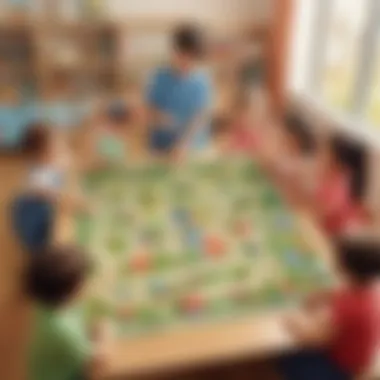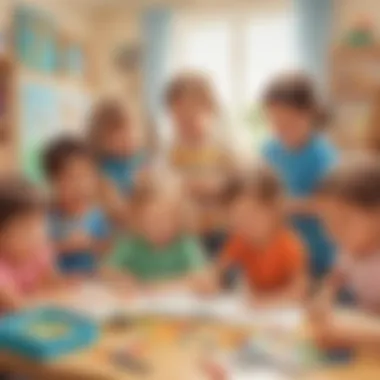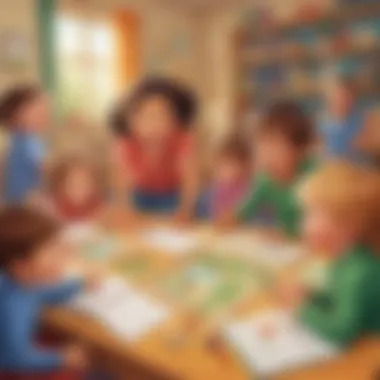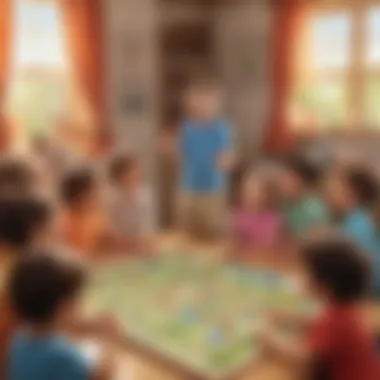Exciting and Educational Games for Kindergarten Kids to Enhance Learning


Fun Activities Ideas
Kindergarten kids thrive on engaging activities that stimulate their minds and foster creativity. From indoor endeavors to outdoor escapades, there are various options to keep these young minds busy and excited. Let's explore a diverse range of activities that cater to their boundless energy and eagerness to learn.
Indoor Activities
Indoor activities provide a safe and enjoyable environment for kindergarten children to play and learn. From building forts with blankets to creating imaginative stories with puppets, there are numerous avenues for exploration within the confines of a cozy room. These activities not only entertain but also promote cognitive development and social skills.
Outdoor Adventures
Venturing into the great outdoors offers a whole new world of exploration for kindergarten kids. Nature walks, scavenger hunts, and simple games like tag or hopscotch allow them to interact with the environment while getting some much-needed fresh air and exercise. Outdoor adventures provide valuable opportunities for hands-on learning and sensory experiences.
Arts and Crafts
Unleash the creativity of kindergarten kids through arts and crafts activities. Painting, drawing, and sculpting with various materials enable children to express themselves artistically and develop fine motor skills. Engaging in arts and crafts not only fosters imagination but also instills a sense of pride and accomplishment in young learners.
Science Experiments
Inspire a sense of wonder and curiosity with simple science experiments for kindergarten children. From creating homemade volcanoes to exploring the behavior of magnets, hands-on science activities help kids learn about the world around them in a fun and engaging way. Encouraging a love for science early on can lay the foundation for future STEM interest.
Cooking and Baking
Involving kindergarten kids in cooking and baking ventures introduces them to basic culinary skills and promotes healthy eating habits. From decorating cookies to assembling mini pizzas, these kitchen escapades offer a tasty blend of fun and learning. Cooking and baking activities also teach valuable lessons about following instructions and teamwork.
Introduction
In the realm of early childhood education, one foundational aspect stands out prominently - the significance of engaging and educational games for kindergarten children. These games serve as powerful tools to stimulate young minds, fostering not only learning but also creativity. For parents, teachers, and caregivers seeking to create enriching experiences for their young charges, these games serve as avenues for holistic development, blending fun with essential skills.
Welcome to Gigglyx
Brief Description of Gigglyx
Gigglyx, a haven of interactive and educational activities, offers a gateway to a world where play intertwines seamlessly with learning. Its core essence lies in providing resources that spark imagination and intellect in young learners. By focusing on hands-on experiences and engaging challenges, Gigglyx excels in instilling a love for exploration and discovery in children. Its uniqueness lies in the fusion of entertainment with educational content, making it a go-to choice for parents and educators looking to enrich the learning journey of kindergarten kids.
Detailed Description of Gigglyx
Diving deeper into the essence of Gigglyx unveils a treasure trove of meticulously curated games and activities designed to captivate young audiences. Each offering within Gigglyx is crafted with precision, aligning with cognitive development stages and educational objectives for kindergarten kids. The meticulous attention to detail in each game ensures not only entertainment but also meaningful learning experiences, making Gigglyx a standout platform in the realm of early childhood education.
Target Audience for Gigglyx
Gigglyx caters to a discerning audience looking for more than just typical games - it appeals to parents, teachers, and caregivers seeking to nurture holistic development in kindergarten children. Its emphasis on interactive and educational elements makes it a prime choice for those invested in enhancing children's cognitive, social, and emotional skills. The platform's adaptability and versatility make it a valuable tool for various educational settings, ensuring that its benefits reach a wide range of educators and caregivers.
Article Overview
Purpose of the Article


This article stands as a beacon for those navigating the vast sea of game options for kindergarten kids, offering a curated selection of engaging and educational activities. By delving into the purpose of this article, readers can grasp the intent behind presenting these games - to foster a love for learning, creativity, and exploration in young minds. Each game highlighted serves a specific educational purpose, ensuring that playtime becomes not just entertainment but a vital component of early childhood development.
Benefits of Playing Games with Kindergarten Kids
The benefits of engaging in games with kindergarten kids are multifaceted and profound, ranging from enhanced cognitive skills to improved social interactions. By involving children in interactive activities, parents, teachers, and caregivers can witness firsthand the positive impact on children's overall development. Through this article, the inherent advantages of incorporating play into the learning process are elucidated, emphasizing the long-term benefits of merging fun with education in the formative years of a child's life.
Interactive Games
When it comes to engaging and educating kindergarten children, interactive games play a crucial role. These activities go beyond mere entertainment, fostering important skills like cognitive development, social interaction, and problem-solving. In this article, we delve into various interactive games that are not only fun but also educational. By participating in these games, children can enhance their learning experience and creativity, making it an ideal choice for parents, teachers, and caregivers.
Memory Game Variations
Matching Cards
Matching cards is a classic memory game that aids in improving a child's concentration and memory retention. By matching identical cards, children enhance their cognitive abilities and visual recognition skills. The simplicity of this game makes it a popular choice for young learners, offering a fun yet challenging way to boost memory recall. One advantage of matching cards is its versatility, allowing for different themes and complexities to suit various skill levels. However, some may find the game to be repetitive, requiring additional variations to continuously engage the players.
Object Sequence
Object sequence is a memory game that involves arranging objects in a specific order based on a given pattern or sequence. This game not only enhances memory skills but also encourages logical thinking and pattern recognition in children. The key characteristic of object sequence is its ability to improve spatial awareness and organizational skills through hands-on manipulation of objects. While this game promotes critical thinking, some children may find it challenging to remember longer sequences, requiring gradual progression in difficulty levels.
Pattern Recognition
Pattern recognition games are excellent for developing a child's cognitive abilities and visual-spatial skills. By identifying and predicting patterns, children enhance their problem-solving skills and logical reasoning. The distinctive feature of pattern recognition games is their focus on sequential thinking and analytical skills. While beneficial for mental stimulation, some children may struggle with complex patterns, necessitating guidance and practice to master this game effectively.
Outdoor Exploration
Nature Scavenger Hunt
The nature scavenger hunt is a hands-on outdoor activity that stimulates a child's curiosity and appreciation for the environment. By searching for specific items in nature, children develop observation skills and learn about the natural world. The beauty of nature scavenger hunts lies in their ability to combine physical activity with environmental education, making learning enjoyable and interactive. One advantage of this activity is its adaptability to different settings, allowing for varying levels of difficulty based on the location and age group. However, challenges such as weather conditions or limited access to natural spaces can impact the experience.
Color Walk
A color walk involves exploring the surroundings with a focus on identifying different colors in the environment. This activity not only enhances color recognition but also promotes sensory awareness and vocabulary development. The key characteristic of a color walk is its simplicity, making it suitable for young children to engage with their surroundings creatively. While beneficial for sensory stimulation, some children may require additional guidance in recognizing subtle color variations or shades during the walk.
Shape Search
Shape search activities involve identifying and matching geometric shapes in the outdoor environment. By honing their shape recognition skills, children improve their visual perception and spatial reasoning. The unique feature of shape search games is their emphasis on geometry and symmetry, encouraging children to explore patterns in the world around them. Although beneficial for cognitive development, some children may find it challenging to differentiate complex shapes or spatial relationships, requiring repetition and reinforcement of these concepts.
Creative Arts and Crafts
Finger Painting
Engaging in finger painting allows children to express their creativity through tactile exploration and sensory stimulation. This art activity not only enhances fine motor skills but also fosters emotional expression and color appreciation. The key characteristic of finger painting is its hands-on approach, enabling children to experiment with different textures and techniques freely. While beneficial for artistic development, some children may struggle with cleanliness and may require guidance in managing the mess associated with this creative activity.
Collage Making


Collage making involves assembling various materials to create a cohesive visual composition. This art form not only encourages resourcefulness but also promotes spatial organization and design thinking. The unique feature of collage making is its versatility, allowing children to explore endless combinations of colors, textures, and shapes. While beneficial for enhancing imagination, some children may find it challenging to conceptualize the final outcome, requiring prompts or examples to inspire their creative process.
Playdough Creations
Playing with playdough offers children a tactile and sensory-rich experience that stimulates imagination and fine motor skills. This activity not only enhances hand-eye coordination but also fosters spatial awareness and shape manipulation. The key characteristic of playdough creations is their open-ended nature, allowing children to sculpt, mold, and experiment freely. While beneficial for sensory development, some children may struggle with the malleability of the playdough or require assistance in generating ideas for their creations.
Educational Activities
Educational activities play a crucial role in the holistic development of kindergarten children. These activities not only enhance cognitive skills but also foster creativity and social interaction. Incorporating educational games into children's routines can significantly impact their learning outcomes. By engaging in activities that combine fun with essential concepts, young learners can grasp new ideas in an enjoyable manner. Parents, teachers, and caregivers can leverage educational activities to create a dynamic and engaging learning environment that caters to the diverse needs of kindergarten kids.
Alphabet Games
Alphabet games are fundamental in laying the groundwork for language acquisition and literacy skills in young children. In this section, we explore three key alphabet games that offer interactive and engaging ways to introduce and reinforce letter recognition and phonetic awareness.
Letter Sound Matching
Letter sound matching is a valuable activity that helps children associate sounds with corresponding letters. This game not only strengthens phonemic awareness but also enhances vocabulary and linguistic skills. By pairing sounds with their respective letters, kindergarten kids can develop a strong foundation in reading and language comprehension. The interactive nature of letter sound matching makes it a popular choice for educators and parents seeking to enrich children's language development.
Alphabet Bingo
Alphabet Bingo is a fun and engaging game that combines learning with excitement. By matching letters on bingo cards with spoken or written clues, children can enhance their letter recognition skills while enjoying the thrill of the game. This activity promotes active participation and reinforces letter familiarity in a stimulating way. The unique feature of Alphabet Bingo lies in its ability to make learning letters an entertaining experience, encouraging continuous practice and retention of alphabetic knowledge.
Sensory Alphabet Hunt
Sensory alphabet hunt taps into children's sensory modalities to reinforce letter identification and tactile learning. By incorporating touch, sight, and sound into the alphabet hunt, kids can engage multiple senses while exploring the alphabet. This hands-on approach to learning not only strengthens letter recognition but also promotes sensory development and coordination skills. The versatility of sensory alphabet hunts allows for adaptable educational experiences tailored to individual learning styles.
Mathematics Games
Math games offer a practical and interactive way to instill numerical concepts and problem-solving skills in kindergarten children. In this section, we delve into three engaging mathematics games that promote numeracy and critical thinking.
Counting with Blocks
Counting with blocks is a hands-on activity that introduces children to basic counting principles and quantity recognition. By manipulating blocks to count objects or shapes, kids can visualize numerical relationships and develop basic arithmetic skills. This game highlights the importance of concrete manipulatives in conceptualizing abstract mathematical concepts, fostering a deeper understanding of numbers and counting.
Shape Sorting
Shape sorting is a visually stimulating game that sharpens children's geometric awareness and classification abilities. By categorizing shapes based on attributes such as size, color, or number of sides, kids can enhance their spatial reasoning and problem-solving skills. Shape sorting cultivates critical thinking skills and geometric fluency, preparing young learners for more advanced math concepts in the future. The interactive nature of this game enables children to explore shapes in a hands-on and engaging way.
Number Recognition
Number recognition activities are essential for developing children's ability to identify and understand numerical symbols. Through games that reinforce number recognition, kids can enhance their counting skills and numerical fluency. Recognizing numbers in various contexts, such as on cards, dice, or objects, helps children build confidence in numerical literacy and prepares them for more complex mathematical concepts. The practical application of number recognition in everyday scenarios cultivates a strong foundation in mathematics and problem-solving skills.
Science Experiments
Science experiments offer hands-on experiences that encourage curiosity, exploration, and experimentation in young children. In this section, we explore three captivating science experiments that spark wonder and scientific inquiry.


Sink or Float
The sink or float experiment introduces children to principles of buoyancy and density through a simple and engaging activity. By observing objects placed in water and predicting whether they will sink or float, kids can explore scientific concepts such as mass and volume. This experiment promotes critical thinking and hypothesis testing while providing a sensory learning experience. The hands-on nature of sink or float encourages children to make observations, draw conclusions, and engage in scientific reasoning.
Rain Cloud in a Jar
The rain cloud in a jar experiment simulates the water cycle and weather phenomena in a visual and captivating way. By creating a miniature cloud inside a jar using water, shaving cream, and food coloring, children can observe condensation and precipitation processes. This experiment not only teaches scientific principles of cloud formation but also promotes curiosity and inquiry into atmospheric phenomena. The interactive aspect of making a rain cloud fosters an appreciation for science and nature, encouraging children to explore the world around them.
Color Mixing
Color mixing experiments allow children to investigate primary and secondary colors by blending different hues together. By combining primary colors like red, blue, and yellow, kids can create new shades and explore color relationships. This hands-on activity promotes visual creativity and artistic expression while introducing basic concepts of color theory. Color mixing experiments spark imagination and discovery, enabling children to engage in sensory exploration and artistic experimentation. The versatility of color mixing games inspires children to discover the magic of color combinations and artistic expression.
Physical Activities
Physical activities play a vital role in the holistic development of kindergarten children. Engaging in physical play not only helps in motor skill development but also promotes social interaction and improves cognitive abilities. Through activities like obstacle courses and dance parties, kids can enhance their physical coordination, balance, and agility. Moreover, physical activities are crucial for maintaining children's overall health and well-being, instilling healthy habits from a young age.
Obstacle Course
Indoor Setup
The indoor setup of an obstacle course offers a controlled environment for children to explore and challenge themselves physically. Indoor setups often involve creatively arranging obstacles like tunnels, balancing beams, and hurdles within a confined space. This setting ensures children's safety while providing ample opportunities for them to improve their coordination, strength, and problem-solving skills. Indoor obstacle courses are ideal for fostering physical development regardless of weather conditions or space limitations.
Outdoor Adventure
On the other hand, outdoor obstacle courses bring a sense of adventure and exploration to physical activities. Outdoor setups may include natural elements like tree logs, boulders, and ropes, creating a dynamic and engaging course for children. The outdoor environment enhances the sensory experience, allowing kids to connect with nature while developing gross motor skills. Outdoor adventures challenge children's physical abilities in different ways and encourage them to embrace the outdoors, promoting a healthy and active lifestyle.
Dance Party
Dance parties offer a fun and energetic way for children to stay active and express themselves through movement. Musical chairs, freeze dance, and follow the leader are popular dance party games that promote physical activity and coordination. Musical chairs involve quick movements and strategic thinking as kids compete for a seat, enhancing their agility and spatial awareness. Freeze dance encourages children to listen to music cues and control their movements, fostering rhythm and creativity. Follow the leader game allows kids to imitate and lead movements, promoting social interaction and physical imitation skills.
Conclusion
In the dynamic realm of early childhood development, the Conclusion section serves as a crucial finale, encapsulating the significance of engaging in stimulating and educational games with kindergarten children. As parents, teachers, and caregivers, understanding the pivotal role of play in fostering holistic growth is essential. By actively participating in playtime activities, young learners not only enhance their cognitive abilities but also hone their social and emotional skills. This section sheds light on the profound impact that intentional game-playing can have on a child's overall development.
Encourage Playtime and Learning
Importance of Play in Early Development:
Diving deeper into the realm of early childhood education, the focus on the Importance of Play in Early Development is paramount. Recognizing play as a fundamental aspect of a child's growth journey, this article emphasizes the role of hands-on engagement in shaping young minds. Play acts as a powerful tool for fostering creativity, problem-solving skills, and enhancing cognitive processes. By incorporating playtime into educational routines, parents and educators create an enriching environment where children can thrive and explore their innate abilities.
Creating Bonding Moments through Games:
Creating Bonding Moments through Games establishes a profound connection between the players, fostering interpersonal relationships and strengthening emotional bonds. When children engage in games with their peers, parents, or teachers, they not only build camaraderie but also learn important social skills such as teamwork, communication, and empathy. These bonding moments not only create cherished memories but also lay the foundation for positive social interactions and collaborative learning experiences.
Engage with Gigglyx Community
Share Your Game Ideas:
Encouraging active participation and idea-sharing within the Gigglyx Community, the Share Your Game Ideas section fosters a collaborative and creative space for parents, teachers, and caregivers. By sharing innovative game concepts and strategies, individuals contribute to a pool of resources that can benefit a wide range of young learners. This collaborative approach not only enhances the quality of playtime activities but also promotes peer learning and idea exchange among community members.
Connect with Other Parents and Educators:
Connecting with Other Parents and Educators amplifies the sense of community and support within the Gigglyx platform. By establishing connections with like-minded individuals who share a passion for early childhood education, caregivers can access a wealth of knowledge, tips, and insights. Engaging with other parents and educators not only fosters a sense of belonging but also provides a platform for brainstorming ideas, seeking advice, and collaborating on enriching experiences for kindergarten children.



